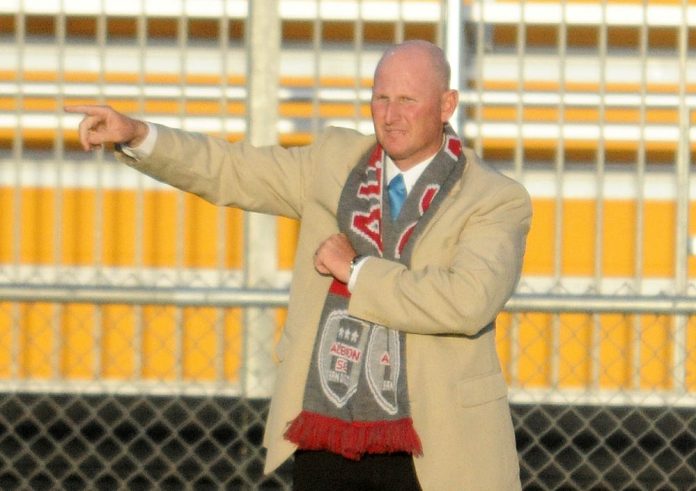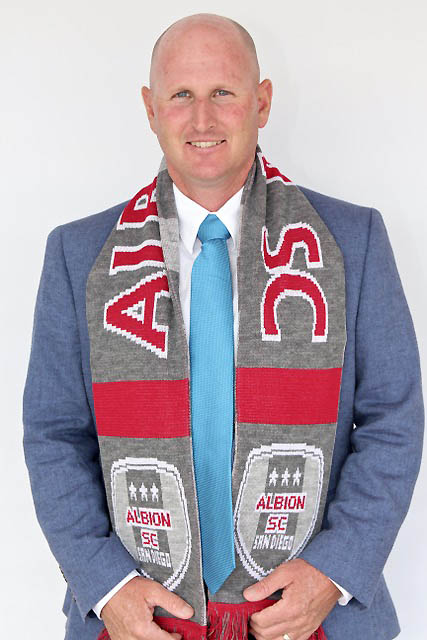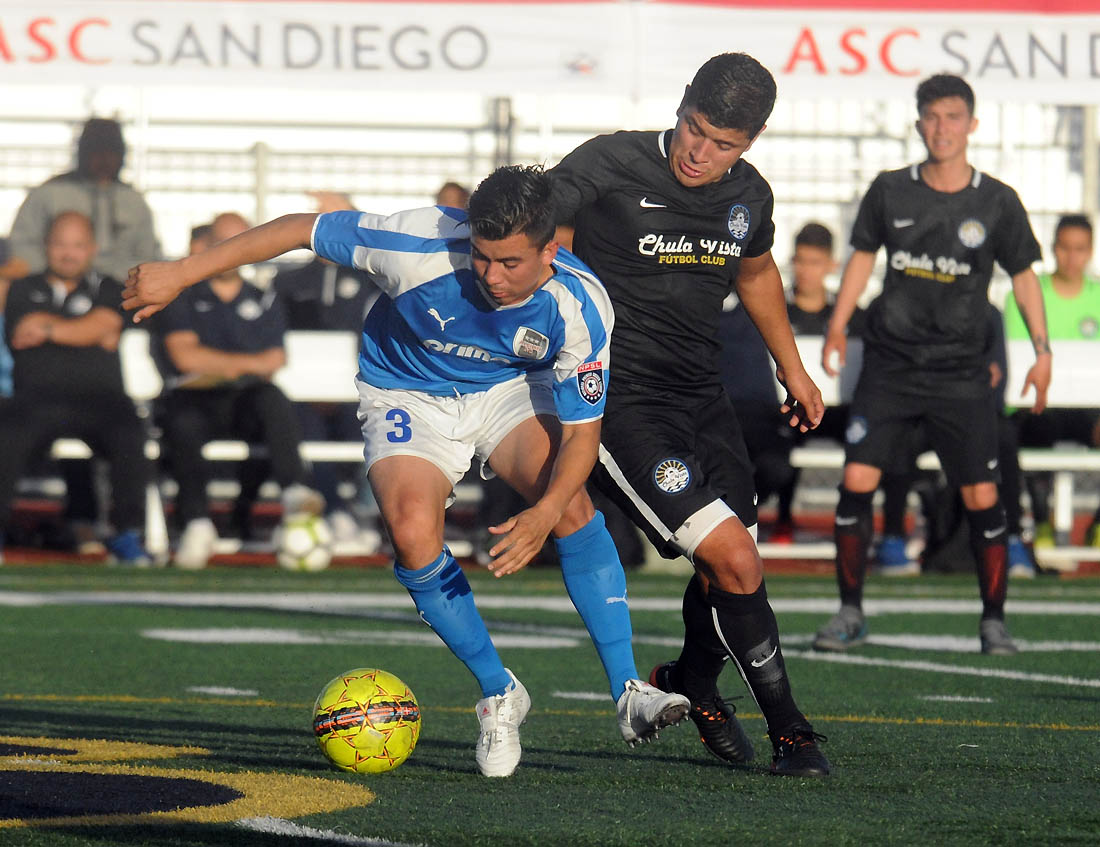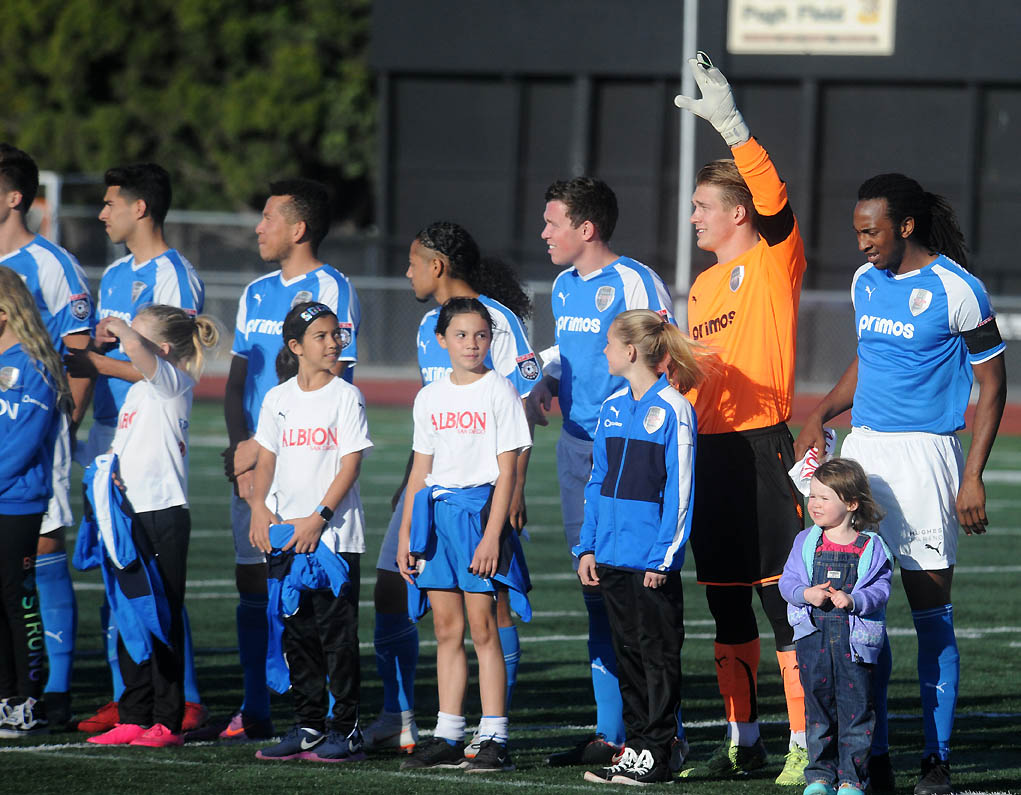
While the 2018 World Cup continues to whittle down teams in advance of its July 15 championship game, playoff soccer is taking place much closer to home.
Albion Soccer Cub (ASC) San Diego will host a National Premier Soccer League Southwest Division regional playoff match Saturday, July 7, at Mission Bay High School.
ASC San Diego, which captured the regular season division championship, will host Orange County FC.
Kick-off is 7 p.m.
A full slate of family-friendly activities are scheduled alongside the match, including a pregame coaches versus all-stars game, free clinics, tailgate party with free barbecue, vendors and entertainment (futsal, street soccer, foot volley, face painting and balloons).
The team will donate $1 for every ticket sold for the July 7 match to benefit the World of Children organization.
ASC San Diego is in its third season competing in the NPSL and operates as a social enterprise, with the goal of mixing its impact on the San Diego community as the club continues to grow and see financial success.
The team’s goal is to make it to the very top of the United States soccer pyramid, representing San Diego at the most elite levels of the game and funding community projects on that path.
ASC San Diego sits at the top of the pyramid for the Albion Soccer Club premier youth development system.
Founded in 1981 in Point Loma, ASC is one of the region’s oldest soccer clubs.

Ziggy Korytoski has coached ASC’s NPSL team since its inception. Korytoski, a native of Springfield, Mass., has resided in Chula Vista the last three years and has overseen several local South County products participate in the program.
Felipe Liborio (Castle Park High School) and Luis Cardona (Bonita Vista High School) are members of this year’s NPSL team.
The top four teams in the Southwest Division qualified for the regional playoffs. ASC San Diego finished first in regular season play with a 9-2-1 record (win/loss/tie), nosing out FC Golden State (8-2-2) for the division lead by two standings points, 28 to 26.
Orange County FC (7-4-1) finished third in the regular season standings with 25 points while FC Arizona (5-2-5) finished fourth in the division with 17 points.
Orange County FC eliminated FC Arizona, 3-0, in last Saturday’s opening round of the division playoffs at Vanguard University in Costa Mesa.
FC Golden State meets CD Aguiluchos in another second-round regional playoff match Sunday, July 8, at Rio Hondo College.
Korytoski’s coaching resume includes stints at the collegiate, professional and national team levels. He has coached in Guatemala at Antigua GFC and Deportivo Coatepeque, as well as a stint at the helm of the Commonwealth of the Northern Mariana Islands men’s and women’s national team.
Since 2010, Korytoski-coached teams have won five titles, including the promotion of Antigua GFC into the first division during his managerial career in Guatemala.
Korytoski has coached ASC San Diego to NPSL division titles in 2016 and 2018. The 2016 team finished regular season play 8-0-4.
“Two titles in three years is pretty good for a new club,” Korytoski explained. “We are putting players into domestic and international leagues. I have been very pleased with our growth and development to this point.
“The goal of the team has always been to ‘inspire greatness.’ This for us is defined by our work in the community, our performance, brand and entertainment on the field, as well as our ability to provide San Diego with a winner.”
The NPSL ranks lower in prestige than Major League Soccer (Division I) and the United Soccer League (Division II). The new USL Division III professional league has come together with five founding teams.
The new league is targeting cities with a population of 150,000 to one million, mostly in cities currently without a professional team, and is projecting a 2019 start.
The NPSL is not officially ranked but occupies its own specific niche in the soccer community, proving a valuable development tool for players as they progress from amateurs to professionals.

How does Korytoski see the future evolution of his team?
“I would say that it is exciting,” Korytoski said. “We’ll evolve but the future is still unknown. The problem with US Soccer is that it is not based on a meritocracy, but based on pay to play. So, as good as a team as we put together, and we have a very, very talented team, we must buy our way into the top leagues – MLS, USL, etc.
“Regardless, I see us competing in the U.S. Open Cup in the coming year and turning heads with our style of play, personnel and results.”
Having coached at the international level, Korytoski places an emphasis in his coaching style on what he termed “being clean.”
“The biggest difference we see between the European, South American player and our own is the quality in control,” the ASC San Diego coach explained. “We put such an emphasis on athleticism that our players struggle with the ability to manipulate the ball. For me, it is the lifeline to every possession and every tactical decision that players are capable of making on the field — they win or lose you games.”
Korytoski said he is seeking several things from his players: quality, intelligence, drive and ambition.
“And I want players who are wanting to prove their value (on and off the field) — I want winners,” he said.
In that regard, Korytoski called his 2018 NPSL team “such a special group to work with.”
“Every morning they are all on time, ready to train/learn and grow,” the ASC San Diego coach explained. “They understand that our results are a byproduct of our process. They seem to enjoy the preparation and look to get better every single day.”
Korytoski sets goals and expectation high for his group.
“We always set our goal to win the conference, which we have done for the second time in three years,” the ASC San Diego coach said. “We also set out to win the NPSL West Region, qualify for the U.S. Open Cup and, of course, win a national championship.
“But I want to build a team that is much bigger in terms of expectations — why can’t we compete in CONCACAF?

Korytoski feels his players receive “great day-in-and-day-out training” as members of the San Diego NPSL team.
“We train 4-5 days per week to develop our players and provide the best opportunity to succeed,” the coach said. “Plus our top players get a very high level competition in front of supporters that create an electric atmosphere.”
Korytoski said he feels a sense of satisfaction for the Albion youth players who have climbed the pyramid to the top of the ladder.
“Absolutely — these players work so hard, and in my mind, Noah (ASC San Diego owner Noah Gins) has provided a great opportunity for them to perform and compete against top-level competition,” Korytoski said. “Every day we have players from our youth program that are winning at the international stage… We are here to develop them, but ultimately winning is just as important to the project.”
Korytoski said he enjoys living in Chula Vista with his family.
“I love being in Chula Vista because it is safe, beautiful, affordable, provides my kids with a great education and is close to downtown,” he said. “I enjoy the diversity as well as the compassion and desire to execute.”

Ziggy Korytoski biography – courtesy ASC San Diego/NPSL
Named the first head coach of ASC San Diego on November 23, 2015, Ziggy Korytoski guided the club to the 2016 and 2018 NPSL Southwestern Conference Championship. The 2016 team ended the season with an undefeated 8-0-4 record, while his overall record with the team is 27-wins, 7-draws and 6-losses. Since 2010, Korytoski coached teams have won five titles including the promotion of Antigua GFC into the First Division during his managerial career in Guatemala.
ASC San Diego are currently the #5 team in the country according to the NPSL Power Rankings (June 25, 2018) and were one of only two teams that completed the 2016 season unbeaten. Their offense enters the playoffs boasting the #2 ranked offense in the league scoring 31 goals this season.
Prior to joining the ASC San Diego, Korytoski received his B.S. Degree in Political Science from Saint Leo University in Florida before pursuing professional football full-time and obtaining his UEFA A License from the Irish FA in 2013. A bilingual educator, he has coaching stops abroad in Guatemala at Antigua GFC, Deportivo Coatepeque, as well as a stint at the helm of the Commonwealth of the Northern Mariana Islands Men’s and Women’s National Team.
Korytoski left the collegiate ranks as an assistant coach at Cal Poly – San Luis Obispo in 2010 to become the head coach of Antigua GFC who played in the Guatemala 2nd Division. Upon his arrival, Antigua GFC earned promotion in his first season at the helm and began an incredible run under his watch of 27 home matches during league play without defeat over the next 2 ½ years. The club continued success the following year with a semi-final appearance in the 2011 Apertura Tournament. They are currently entered to compete in the 2016-17 CONCACAF Champions League for the first time and are rostered with six players that Korytoski either identified or helped develop as the foundation of the club.
From 2013-14, Korytoski served as the head coach of Deportivo Coatepeque in Guatemala’s top league. He is the only American head coach in the team’s history and was given the responsibility of turning around the club after a disastrous start to their inaugural campaign in the Liga Nacional. After 1 win in 13 matches prior to his arrival, Korytoski guided the club to 5 wins and 2 draws during the next 13 competitions helping to stabilize the club and avoid relegation.
Korytoski has had a number of players under his tutelage go on to represent their country at the international level including Rodrigo Saravia, Pablo Melgar, Luis Rodriguez, Cali Villa, Jose Carlos Castillo, Fredy Thompson, Carlos Gallardo and Victor Ayala. Players from ASC have also moved on to international and domestic careers such as Eric Avila, Thomas Olsen, Alex Guillen-Torres, Tre Hayes and Travis Nicklaw.
Korytoski’s teams are known to excel in all phases of the game. By consciously demonstrating an attacking brand of football, his teams are disciplined in possession, and play a short quick passing game in which players are constantly in motion and aware of all space at any moment within the game – searching for the “Arsenal Goal” as often as can be created.
Defensively, his teams are known to be extremely organized with desire to bait teams into certain areas of the field where they enter with swarms of collective pressure. The desire is to return possession of the ball in favor as soon as possible, though they have the ability to adapt if a change of momentum has taken place or if the game demands of us something else.
“Our philosophy has always been to win with a good mix of young and experienced players. I have never been afraid to play a youth player that I felt was ready, as I believe that homegrown players save cost for the future and allow for more consistency in the development of a club philosophy as players understand what is being demanded of them at any moment in the game – as well as off the field and in the community.”
A native of Springfield, Massachusetts, Korytoski possesses UEFA and USSF ‘A’ Licenses, a NSCAA Premier Diploma and a KNVB Coaching Certificate. He has also served as a scout for US Soccer and the Seattle Sounders. He and his wife Mayumi reside in Chula Vista with their two children, Kaisei and Mariana.
COACHING QUALIFICATIONS:
- UEFA “A” License
- USSF “A” License
- NSCAA Premier Diploma
- S. in Political Science, Saint Leo University (Florida)
INTERNATIONAL AND PROFESSIONAL COACHING CAREER:
- 2007 Men’s and Women’s National Team (CNMI)
- 2009-2011 Antigua GFC (Guatemala)
- 2013 Antigua GFC (Guatemala)
- 2013-2014 El Deportivo Coatepeque (Guatemala)
- 2016-Present ASC San Diego (NPSL)
ACHIEVEMENTS:
- 2010-2011 Apertura Champions, Clausura Champions, Antigua GFC Promotion
- 2009-2013 27 consecutive home games without defeat
- 2016 NPSL Southwestern Conference Champions without defeat
- 2018 NPSL Southwestern Conference Champions
How much does it cost to win a World Cup?
If figures gathered by researchers at CableTV.com are correct, that figure is $185 million for Brazil’s national team entry in this year’s tournament in Russia.
The gargantuan figure is based on the most up-to-date salary information reported for each World Cup player — with currencies covered to US dollars.
It’s no secret that money talks. Teams with the top paid players have a higher chance of winning the World Cup. For example, Brazil, Argentina, Spain and France have all won at least once. It’s not surprising that all four nations land among the top five highest-paid national teams in the world.
Moreover, team payroll sizes seem to have no correlation with geographic region, according to the report.
For instance, Lionel Messi, with an $84 million salary, makes up nearly half of Argentina’s hypothetical team salary of approximately $170 million (there are 22 other players on the team).
Read the full report here: https://www.cabletv.com/blog/fifa-world-cup-team-salary/
According to the CableTV.com report, the average player salaries of the top five highest-paid 2018 World Cup teams are:
1) Brazil – $9,755,944
2) Argentina – $8,503,432
3) Spain – $6,642,278
4) France – $7,092,399
5) Belgium – $6,072,145
As far as combined national team salaries go, the leaders by region include:
South America
Brazil – $185 million
Argentina – $170 million
Colombia – $83 million
Uruguay – $78 million
Peru – $18 million
CONCACAF
Mexico – $80 million
Costa Rica – $15 million
Panama – $4 million
Europe
Spain $153 million
France – $148 million
Belgium $140 million
Germany – $136 million
Portugal – $130 million
England – $122 million
Poland – $53 million
Croatia – $73 million
Serbia – $50 million
Switzerland – $37 million
Denmark – $35 million
Iceland – $35 million
Sweden – $33 million
Russia – $32 million
Africa
Nigeria – $52 million
Senegal – $45 million
Morocco – $35 million
Egypt – $21 million
Tunisia – $9 million
Asia/Oceania
Japan – $53 million
Australia – $27 million
Saudi Arabia – $17 million
Iran – $11 million
South Korea $9 million











